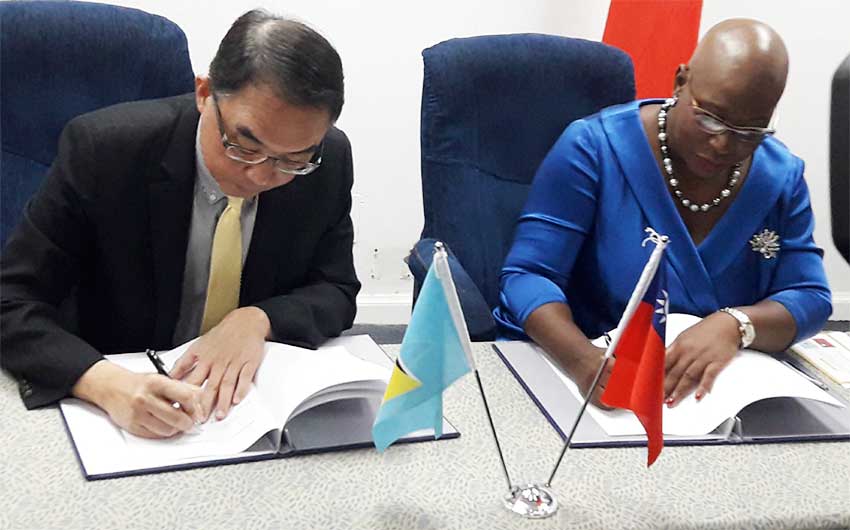
THE official signing ceremony of the “Application of Information and Communication Technology for Education Development Cooperation Project” took place on the afternoon of Wednesday 27th November at the Auberge Seraphine Hotel. In attendance were Dr Gale T.C. Rigobert, Minister of Education, Innovation, Gender relations and Sustainable Development; His Excellency Douglas C.T. Shen, Ambassador of the Republic of China (Taiwan), as well as teachers and officials from the Ministry of Education. The agreement was signed by Minister Rigobert and Ambassador Shen.
Regarding the ceremony, Michelle Charles, Permanent Secretary in the Department of Education, remarked, “This symbolic event culminates months of discussion which sought to align the vision and goals of the Department of Education with the offerings and expertise of the Taiwanese Government.”
She noted that the integration of information and communication technology into instruction and learning had been a strategic priority for the department of education. It was in relation to this which she said the Government of Saint Lucia, back in January of this year, had ratified the Information and Communication Technology (ICT) education policy and strategy which created the impetus that pushed the ICT agenda forward. She asserted that a dynamic education system was critical to the creation of an innovative society. She said it was necessary to redesign the education system to meet the demands of the current technological era.
She said the agreement of the ‘Information and Communication Technology for Education Development’ will focus on three core components. The first component is ICT for educational infrastructure, which will seek to conduct planning, development, and implementation of application systems and physical ICT Infrastructure at the Department of Education, including six educational institutions. These institutions include the Entrepot Secondary School, Sir Ira Simmons Secondary School, Patricia D. James Secondary School, Soufriere Comprehensive Secondary School, Gordon and Walcott Memorial Methodist School and the Camille Henry Memorial School.
The second component of the agreement was the development of an information system, which, according to Charles, will result in the creation of an online platform which will assist with learning activities in schools. The final component, which relates to ICT capacity building, will focus on improving the quality of human resource, and to increase the pool of skilled labour via ICT education and training. Charles said that all three components were in accordance with the ‘ICT in Education Policy and Strategy’ for Saint Lucia. She remarked, “These are exiting times for the Department of Education, Innovation and Gender Relations. And we, very much are looking forward to the implementation of this suit of actions over the next three years.”
Douglas Shen, in his address, said that he was pleased to witness the strengthening of the framework for cooperation in ICT between Saint Lucia and the Republic of China (Taiwan). He said ICT was able to enrich and transform education for the better, and that it was “critical for teachers to learn how to apply ICT into their education programme properly in order to improve students’ problem-solving capabilities and academic performances.” He stated further, “ICT is the key to the world, and the ICT education project is to facilitate the teachers to teach their students how to use this key.” He said the ICT education project will focus on capacity-building for teachers to design courses and apply ICT into their ordinary teaching programmes through a series of training workshops.
Minister Gale Rigobert, in her address, remarked, “We cannot speak of education in the 21st century without recognising the role of the infusion of ICTs in education.” She extended gratitude on behalf of the Government of Saint to the Government of the Republic of China (Taiwan) for the partnership on the ‘Smart Nation Initiative’, of which the ICT Project was a part of. She said, “That is why so many communities now can boast of having free WiFi; that is why we have the GiNet Programme; that is why there is expanded bandwidth in schools, and that is why more of our teachers have been exposed to what technology can offer.”
In closing, she remarked, “On behalf of the children of this nation, on behalf of the teachers and other stakeholders, let me express our deepest thanks for your generosity for this partnership and to say that what you have done is to ensure that the name Taiwan is very much embedded in the social psyche of this nation because of your generosity.”





![Attendees at the UHC logo and website launch [Photo credit: GOSL]](https://thevoiceslu.com/wp-content/uploads/2026/02/Attendees-at-the-UHC-logo-and-website-launch-380x250.jpg)






![Remnants of an alleged drug boat blown up in a lethal strike by the U.S. military last week surfaced off Canouan on Saturday [Photo credit : St Vincent Times]](https://thevoiceslu.com/wp-content/uploads/2026/02/Remnants-of-an-alleged-drug-boat-blown-up-380x250.jpg)
